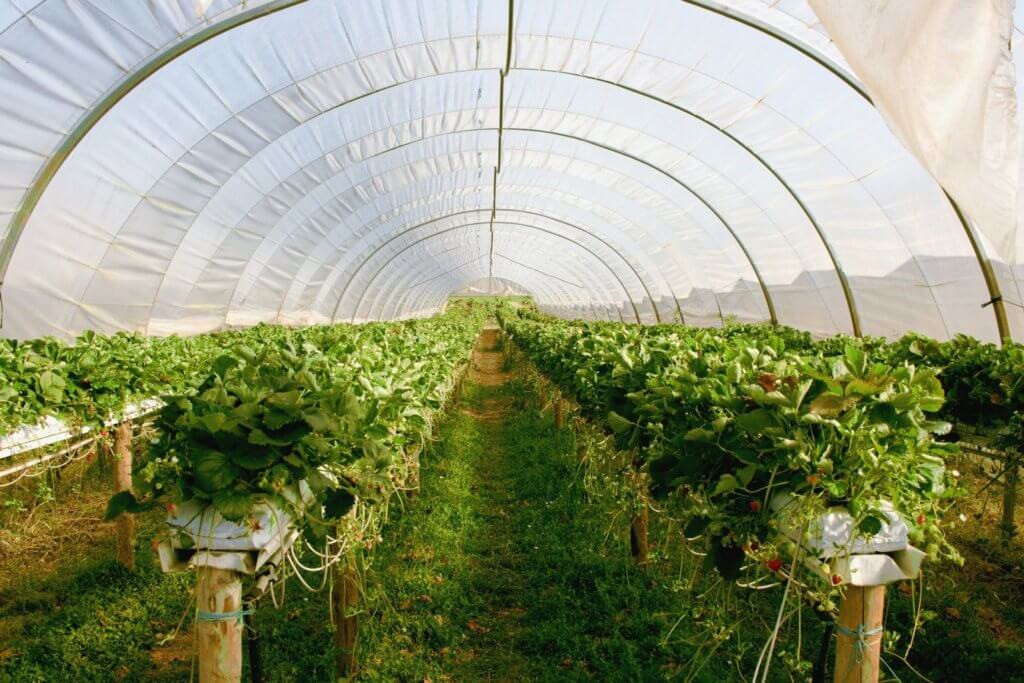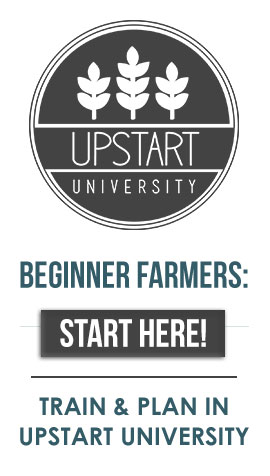Digital farm footprints
While farming typically brings to mind rugged independence, local community, and a disconnect from the rigors of 21st-century life, there is no denying the importance of a farm website and digital presence for modern farmers.
While not every urban farm needs a website, there are a number of benefits and risks to consider. In this article, we’ll explore the timing, benefits, challenges, and work required to operate a website for your farm.

Do I need a website if my farm is tiny? What if I don’t want to scale?

If your farm is a hobby farm, then a website is probably unnecessary.
If you’re running a hobby farm or very small farm, a website might not be necessary. Your small farm might provide enough produce to supply the restaurants in town. You might have a dedicated CSA which purchases produce directly from your farm. Or you provide enough produce to keep a single grocery well-stocked.
If you have no desire to scale up from these examples, a website might be an unnecessary cost. A local farmer with close ties to local businesses and community can make great use of traditional medium and personal relationships. However, you should consider all of the benefits before writing off the possibility!
Costs, benefits, and challenges
Time and money are precious commodities. To that end, we’ve put together a brief analysis of the costs, benefits, and challenges of having a website.
Costs
First, let’s look at the costs of a website:
$20–$80 for web hosting
Wordpress offers a promotional $20 for one year and $80 for each year after that.
$200–$500 for web development
Because farm websites generally don’t have any advanced features, entry-level web development is more than sufficient. We’ll cover creating a website more in-depth next week!
2–4 hours a week in maintenance
A website will (generally) take 2 hours or so a week of your time to post updates, manage the website, and connect on social media.
Benefits
The benefits of a website can be indirect, which makes them difficult to quantify. Accessing and collecting data on advertising and marketing is nearly impossible, especially at the scale of most farm websites. Instead, consider the more ephemeral benefits and goals:
Email lists
Gathering a strong email list should be a big goal for your website. If you can regularly send updates on your crops, farm, and public appearances, you’ll draw that many more customers to your products. (Nobody can visit your farm stand if they don’t know where it will be and when!)
Social proof
You can tell people how great your produce is, but eventually, you will need to show them. Websites help to convey transparency, provide a place to spotlight customers and products, and give a “hub” for customers to advocate for your farm. All of these functions draw more customers to your produce.
Sales from digital traffic
Much of the traffic to your site will be organic—that is, it will come from searches that people make through search engines like Google, Bing, and Yahoo. In this case, they’re probably looking specifically for you or something you offer. Online presence is the only way that you can take advantage of this type of traffic. Some of those web viewers will become customers.
Basic contact information
If you want people to sign up for CSAs, ask questions that will lead to a sale, be able to tour the farm, subscribe to your email list, etc., then you will need to have contact information out there. While contact forms and boxes can be tough to maintain, a simple solution is to include an email address or phone number to contact your farm.
Advertising
The most obvious benefit is the most simple. A web presence is likely the first resource potential customers will turn to. We’ve covered this earlier when we discussed the costs and benefits of a website, but it bears repeating. Websites offer the opportunity to spread your brand, illustrate your product offerings, and speak directly to customers. If you plan on sharing links, posting advertisements on media platforms, or hosting some “learn more” content, then you need somewhere to host it.

Feedback
Public email addresses and social media profiles give your customers an opportunity to give feedback, complaints, and concerns. This, in turn, allows you to adjust your product offerings, catch quality control issues, get a better understanding of your markets, and discover demand/niche market opportunities.
Partnerships
All of the four markets will want to share the word about a partnership or interactions with your farm. A website is a thing that those who are already excited about your farm can use to spread the word! Customers value transparency, locality, and approachability, and all of these qualities can be hard to broadcast without a digital presence. Each of the four markets will expect you to accept a certain amount of the burden of spreading the good word. A website is a great way to handle your part of the work.
These benefits are hard to measure in tangible terms, but for the price of $80 a year and a few hours per week of web time are almost certainly worth the expenditure of money and time.
For example:
You grow in an urban area. You are using social media and other marketing materials to bring 500 visitors to your small farm’s website every week and 5 of those people each week become “leads” (That’s 1% of all site visitors). 1 of them is a big lead like a restaurant and 4 are small leads like household heads or farmers’ market goers. If even one of those 5 converts to a customer (0.2%), then you’re looking at 1 new big customer every five weeks. The money spent on the site is made up as soon as you’ve made the same amount in sales to that customer.
In the same scenario, a news outlet learns about your innovative farm, finds you through a quick internet search, contacts you through the site, and runs a story on the farm—including the name of the farm and where to find you—in the newspaper one week. Thousands of people read it, and dozens are converted into customers.
Challenges

Website development can have a lot of small, but time-consuming problems. Like ensuring your website is capable of being visited without error on four different browsers!
Cost
Web domains and server hosting are relatively inexpensive but still represent a drain on your resources.
Ability
Most farmers won’t have extensive web design experience. Without those skills, you’ll either be relying upon a pre-based template, your own skills, or paying a professional.
Time
After setting up a website, a farmer still needs to maintain and operate the web content. The ways to spend your valuable farming hours are endless: blog posts, farmers’ market times, responding to customer feedback, posting photos, etc. There are options that add more or less time in operation. They can be time sucks but they don’t have to be.
As you can see, a website can create profit if used well. Different markets will use websites differently, however. To really make your website work for you, you’ll need to consider the markets in which you’ll be advertising.
The four markets

Visit our Upstart University course detailing the big four markets for urban/indoor farmers!
Consider the four markets and how a website will allow you to interact with each one in turn:
- Farmers’ Markets: a website will allow you to advertise to potential customers, inform repeat customers of your offerings and presence at local farmers markets.
- CSAs: a website will help you inform your clients of incoming product, special offers, and availability.
- Groceries: probably the market for which a website is least valuable. Nonetheless, any farm looking to expand to additional stores will need to begin marketing a brand with which a website will be very useful. Also, most farmers sell to more than one type of market.
- Restaurants: many restaurants also choose to create a narrative surrounding their food. These restaurants will be interested in your farm’s story as a way to improve the narrative surrounding their dining experience. Your website can play an essential part in illustrating the unique product that you bring to market for restaurants.
Do you need a website for your farm?
After reflecting on the expense, benefits, and challenges, make the decision regarding whether your new farm needs a website. You should consider your operating budget, the time you have to invest in creating and maintaining a website, and the potential benefit you can expect from a digital platform.
Keep an eye on our feed! Next week we’ll be publishing an article on how to build a website for your farm. If you want to learn more about how a digital presence can help your farm, check out our class on Social Media Marketing on Upstart University!



Web developer since the old Netscape days, here. Great article 🙂
Just a couple comments, if you decide you want a site:
1) “free” Web hosting with inserted ads from various hosting services are worth exactly what you paid for them.
2) if your friend/cousin/kid/ tells you “I can make an html page”, say thanks, and move on.
3) unless you are creating a completely new program application, build your site on the WordPress platform, wherever you get hosting. You don’t reinvent the wheel, it does the heavy lifting for you, it’s free and if someone types “fram” vs. “Farm” YOU can fix it without calling the Web geek to do it for you.
Ken, great tips. We’re fans of WordPress over here; it might be more complicated than other platforms, but it has way better functionality and versatility. Thanks for your thoughts!
Thanks 🙂
WordPress is more complex than just typing a Word document, but not much, as the ènd user. A half hour of instruction or a couple online tutorials is usually enough to get rid of the “scary” 🙂
I still do this for a living, until the farm is in full swing, and I think buying the right domain name and hosting plan is a MUCH bigger pain inna butt than managing the websites 🙂
If you do get someone to do the setup work, make sure they want to help empower your business, not just hold you hostage for fees to fix every typo.
I use green web hosting for my sustainable business and hope to go back to Maui and start a vertical farm there. Thank you as always on your insightful articles.